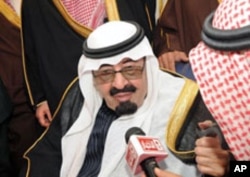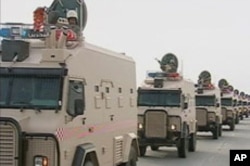The clamor for political change has gripped many nations of the Middle East, but Saudi Arabia has been a comparative oasis of calm. There is concern about the possible outbreak of political unrest there.
Former U.S. Ambassador to Yemen Barbara Bodine says of those countries that so far have escaped the kinds of political protests that have forced change in Egypt and Tunisia, Saudi Arabia concerns her the most.
"There you have all the precursors that we’ve seen in other countries," she said. "You have a very aged leadership that is very narrow, very insular; a very young population; you have very large income disparity, unemployment."
Saudi authorities have firmly clamped down on any political demonstrations. Small demonstrations in early March, primarily by minority Shi’ite Muslims in the restive Eastern Province, were quickly suppressed by security forces.
Emile Nakhleh, former head of the Political Islam Program at the Central Intelligence Agency, says the danger signal to watch for is an eruption of protest outside Eastern Province.
"Saudi Arabia, I would say, is the two-ton elephant in the room that nobody talks about. I think Saudi Arabia is truly the country to watch. And I think the signpost in Saudi Arabia that we need to look at as a sign of potential trouble is if there are some protests in places like Jeddah, not in the Eastern Province where the Shia live," said Nakhleh.
Jeddah is a comparatively liberal city in the kingdom, especially when compared to the capital, Riyadh.
Calls for change
Saudi Arabia is a monarchy, dominated by conservative Sunni Muslims, that has little patience with any political opposition. Yet, as Emile Nakhleh points out, some Saudis signed a petition to King Abdullah asking for change.
"A petition that was signed by over 200 Saudis from cross [all] walks of life demanded that - well, petitioned - the king to institute real change - a constitution, a parliament with legislative powers, independent judiciary. I mean, there were very real demands," said Nakhleh.
However, says Barbara Bodine, Saudi Arabia’s rulers may not be able to respond positively to such calls.
"I think one of the criteria on whether a government is able to adapt to the demands or break under the demands is whether or not it has the political institutions that will help it evolve very quickly," she said. "And you don’t really have that in Saudi Arabia. So I think I would watch Saudi Arabia as the next big one. If Saudi Arabia were to start to fracture, I’m not sure what would hold it together."
Saudi intervention in Bahrain
In what may be the clearest example of Saudi Arabia’s unhappiness at calls for change, it sent a military force into neighboring Bahrain to help the Bahraini government stifle the protests there. Analysts say the action was sparked by Saudi fears of purported Iranian sponsorship of the protests.
But a new report by the International Crisis Group calls the Saudi fears unfounded. It labels the Bahraini crackdown and the Saudi intervention "dangerous moves" that could exacerbate sectarian tensions since Bahrain has a Shi’ite majority population but a Sunni-dominated government.
Emile Nakhleh notes that Arab states that backed the U.N. establishment of a no-fly zone over Libya have not supported the Saudi intervention in Bahrain.
"It’s very interesting that many Arabs have supported the Western no-fly zone over Libya and Western military attacks on Libya, but opposed Saudi intervention in Bahrain because they view the Saudi intervention in Bahrain as an anti-Shia thing rather than in defense of necessarily the Bahraini regime, but as a promoter of sectarianism," said Nakhleh.
How will US respond?
Saudi Arabia is a key U.S. ally in the region. It is not known how the U.S. would respond if there is an outbreak of political upheaval and demand for change in the kingdom, especially if there is any intelligence indicating involvement of al-Qaida in the unrest. Al-Qaida is bitterly opposed to the Saudi monarchy, especially for its alliance with the U.S. Al-Qaida chief Osama bin Laden came from a wealthy Saudi family.
There are also fears of steep increases in oil prices if unrest erupts as Saudi Arabia is the world’s second biggest oil producer, only slightly behind Russia.






